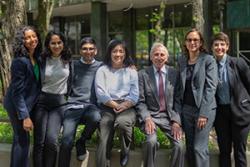
July 27, 2020, New York – Students asked New York’s Appellate Court on Friday to reject an effort by Fordham University to overturn a decision ordering the school to recognize the Students for Justice in Palestine (SJP) club. The students are represented by the Center for Constitutional Rights, Palestine Legal, and cooperating counsel Alan Levine.
“It’s ridiculous to us that our university is still trying to censor us now,” said Veer Shetty, vice president of SJP at Fordham. “We’ve already been active for a year, and appealing the court’s ruling feels especially cruel.”
The original case stems from a fall 2015 effort by Fordham University students to start a Students for Justice in Palestine club on campus. Administrators dragged out the application process for a year – including multiple meetings, questioning students on their political views, and amendments to SJP’s constitution.
In November 2016, Fordham’s undergraduate student government approved SJP as a student club. One month later, Fordham University Dean of Students Keith Eldredge took the unprecedented step of vetoing the student government’s approval based on SJP’s “political goals” and the possibility it would lead to “polarization.”
The Center for Constitutional Rights, Palestine Legal, and Alan Levine sued Fordham on behalf of four students in April 2017, winning the case in August 2019 when a New York court annulled Fordham’s decision, mandating that the university recognize SJP as an official club.
Fordham appealed the ruling in January 2020. Oral argument is expected in the Court’s September term.
While all of the original students who wanted to form SJP have since graduated, petitioner Veer Shetty was successfully added to the suit in 2019 as a sophomore who wanted to join SJP. Shetty has served as SJP’s vice president during the 2019-2020 school year following the legal victory. Fordham is also challenging the ruling accepting Shetty as a petitioner.
“Last August, the court found that Fordham acted irrationally in banning SJP and ordered Fordham to recognize the club,” said Maria LaHood, deputy legal director at the Center for Constitutional Rights. “Now, even after SJP has been active on campus for a year, Fordham is still shamelessly trying to stop them – for what?”
The brief filed by the Center for Constitutional Rights, Palestine Legal, and Alan Levine argues that the lower court properly found that Fordham violated its own rules in denying SJP club status and that Fordham’s focus on the reported conduct of SJPs at other schools in denying club status to SJP at Fordham was irrational.
“Fordham should never have vetoed SJP in the first place,” said Palestine Legal senior staff attorney Radhika Sainath. “The fact that the school is still trying to stop students from speaking out for Palestinian freedom, now, with annexation and in the middle of a pandemic, is beyond belief.”
“We are confident that the appeals court, like Supreme Court Justice Bannon, will find that Fordham‘s denial of club recognition for SJP was no more than an act of naked political censorship,” said attorney Alan Levine.
Read more about the case at the Center for Constitutional Rights’ case page and Palestine Legal’s case page.
Palestine Legal is an independent organization dedicated to protecting the civil and constitutional rights of people in the US who speak out for Palestinian freedom. Our mission is to bolster the Palestine solidarity movement by challenging efforts to threaten, harass and legally bully activists into silence and inaction. Visit www.palestinelegal.org and follow @pal_legal.
The Center for Constitutional Rights works with communities under threat to fight for justice and liberation through litigation, advocacy, and strategic communications. Since 1966, the Center for Constitutional Rights has taken on oppressive systems of power, including structural racism, gender oppression, economic inequity, and governmental overreach. Learn more at ccrjustice.org.
